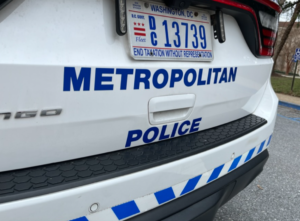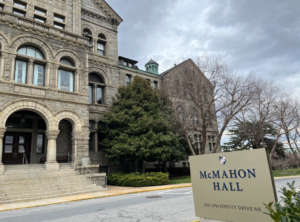Sexual Assault Awareness Month Offers Forum and Support for Survivors
By Angelica Sisson
April is National Sexual Assault Awareness Month and the Office of the Dean Students and PEERS (Peer Educators Empowering Respectful Students) organized a variety of events in order to recognize this. Most notable was the Take Back the Night event held Wednesday in the Edward J. Pryzbyla Great Rooms.
Take Back the Night is an event that is put on annually in over 30 countries since its inception in the 1970s. The event serves as a forum for domestic and sexual assault survivors to tell their stories to an open and welcoming audience.
Take Back the Night at Catholic University was brought to campus by senior politics major Erin Cavalier and was first held three years ago. Around forty people attended the first event, the next year attendance grew to around 75 and at the third annual Take Back the Night this year, attendance was the highest its ever been with about 175 students attending.
Senior psychology major Nikki Caulfield said that since her freshmen year four years ago the attitude toward the treatment of sexual assault on campus has greatly improved.
“I think awareness has been raised,” Caulfield said. “People have become a lot more sensitive about the topic.”
Caulfield also said she now felt much safer on the campus and that she was proud of the people on this campus for changing their attitudes and responses towards sexual assault.
Caulfield said that in the past there had been something like Take Back the Night before the inception of the event but it was more like a prayer vigil and did not give sexual assault survivors the chance to tell their stories.
In addition to Take Back the Night, many more programs have been launched for the prevention of sexual assault and to provide assistance to survivors.
Starting in 2014, freshmen students had to complete a Bystander Intervention Training Program online the summer before coming to campus in addition to the sexual violence awareness training that was already a part of the orientation program. The Bystander Intervention Training Program serves to educate people on what consent is and how to appropriately intervene when a situation passes into nonconsensual terms.
Also beginning in 2014 was the Good Samaritan/Medical Amnesty Policy. Under this policy, any student who seeks medical assistance for him or herself or for another will be not be held accountable to the University’s code of conduct. According the Dean of Students’ website, “these situations will be addressed as health and safety concerns.” In this way, students reporting a sexual assault will not be punished for any discrepancy involving alcohol or drug use.
While there are resources available to assist victims of sexual assault both Caulfield and Cavalier agreed that more could always be done to prevent sexual assault. Caulfield said that the topic still makes people uncomfortable and thereby reluctant to talk about it; she emphasized the importance of open and inviting events so that people would feel more encouraged to take part in sexual assault prevention.
“Members of our community are encouraged to educate themselves about the prevalence of sexual violence nationwide, the myriad of resources available within our very community and on effective bystander intervention strategies,” said Desmond Daniels, Associate Director of Student Conduct and Ethical Development in the Dean of Students Office.
While in past years Catholic University has made a conscious effort to improve how it deals with sexual assault Cavalier said that much more could still be done to assist survivors in dealing with the aftermath.







